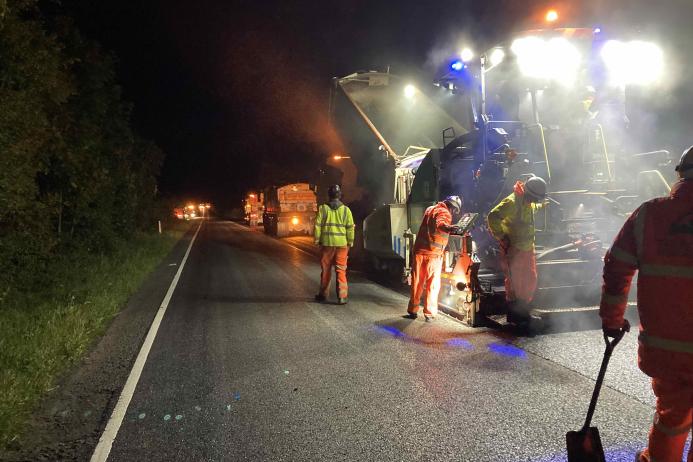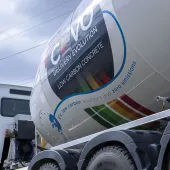Breaking new ground for lower-carbon roads
National Highways extends polymer-modified bitumen trials on strategic road network
NATIONAL Highways have extended their trials of bio-binders to include warm mix asphalt (WMA) and recycled content to provide a circular, lower carbon, Clause 942 thin surface course solution that will help it meet its net-zero objectives.
On the trials, Heidelberg Materials have used their CarbonLock asphalt containing polymer modified bitumen (PMB) bio-binders, produced as both hot mix and warm mix asphalts, and containing up to 30% reclaimed asphalt (RA) to test the feasibility of various configurations.
Bio-binders contain natural biogenic material, which absorbs and stores CO2 throughout its life, which is then ‘locked’ within bio-binders and not released back into the atmosphere, even when the asphalt is recycled. In addition, the PMB binder used in the trials is expected to enhance durability and further extend the life of the asphalt, reducing the frequency of maintenance interventions.
The latest trials on the A2, near Canterbury, Kent, and A34, near Newbury, follow the success of last year’s trial on the A30 in Devon and extensive lab-based testing at the University of Nottingham in conjunction with AtkinsRéalis Jacobs Joint Venture (JV).
On the A2, four sections – each comprising a 45mm surface course and varying from 700 to 1,000 lane metres in length – were carried out as part of the National Highways – A2 Kingston Scheme.
The PMB bio-binder trials included: a control section using conventional WMA with a standard PMB; CarbonLock PMB asphalt produced as hot mix asphalt; CarbonLock PMB asphalt produced as WMA; and CarbonLock PMB asphalt containing 20% RA produced as WMA.
The A34 trials, carried out as part of the National Highways – A34 SB South Isley to Beedon Scheme, replicated these but added a fifth trial section using CarbonLock PMB asphalt containing 30% RA produced as WMA.
Adrian Hadley, technical head (asphalt and aggregate) at Heidelberg Materials UK, said: ‘We are increasingly working with our clients to reduce the carbon impact of road maintenance and construction projects, helping them meet their net-zero ambitions. These further trials with National Highways are another example of this and move us another step forward.’
According to Heidelberg Materials, the A2 trials used over 1,500 tonnes, and the A34 around 500 tonnes, of CarbonLock asphalt, reducing the carbon emissions associated with the asphalt by around 26%.
Umesh Parajuli, senior advisor (pavements) in the safety engineering and standards division, National Highways, commented: ‘National Highways is committed to trialing innovative lower carbon asphalt solutions to help meet our 2040 net zero carbon deadline for construction and maintenance activities on the SRN.
‘The performance of the CarbonLock asphalt laid on the A30 has been excellent and now the second phase of the trial is looking at using bio-binders in conjunction with other low-carbon innovations such as WMA and RA as well. We hope these trials will help to bring innovative low-carbon asphalt solutions using bio-binders into our specification.’










